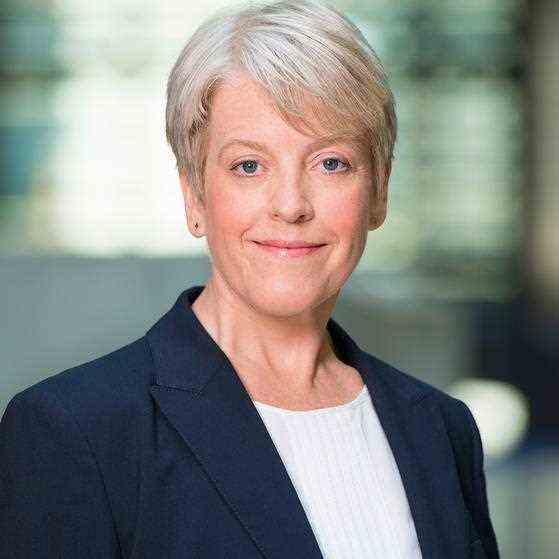Status: 02.10.2021 4:16 a.m.
In the new Bundestag, too, women remain in the minority. Their share has only increased slightly – from 31 to 34 percent. Politicians like Claudia Roth and Gyde Jensen want to change that. Your ideas are different.
Green politician Claudia Roth has often seen how tough politics can be for women. She has been politically active for several decades, most recently she was Bundestag Vice President. Roth saw countless situations in which men pushed forward and women first had to gain respect. Again and again she advocated equal participation.
Roth is not really happy that the proportion of women in the Bundestag has risen slightly: it is “far too modest” to see good news in it. When it comes to equal rights, she is deeply convinced that we don’t need a little more equal rights, but equal rights, “she said in an interview with the ARD capital studio. After all, more than half of the population are women.
But Roth doesn’t just want to look at the numbers. She also wants to see politics from other angles. For example, it makes a difference if women sit on the traditionally male-dominated defense committee and men sit on the family committee. The Green parliamentary group in the Bundestag consists of around half of women. The party has a quota for women in its statutes. A recipe for success, according to Roth. Many young women belong to the new parliamentary group. Because they are good, says Roth, and use the quota as a “key that opens the door for them to show what they can do”.
Gyde Jensen also wants more women in parliament. When the FDP politician moved from Kiel to Berlin in 2017, she was the youngest member of the Bundestag. Your parliamentary group is clearly more masculine than that of the Greens, and more women are represented among the Left and the SPD.
Jensen is probably one of those who make the difference: Shortly after moving into the Bundestag, she took over the management of the Committee on Human Rights and Humanitarian Aid. At that time she jumped into the deep end, she recalls. Don’t hesitate for a long time, take action and take responsibility before a male colleague raises his hand. This can also be understood as a message to other women. Her party rejects a quota for women. In order to increase the proportion of women, Jensen also speaks of a political goal that must be set. “Especially if we want more women to feel addressed by politics.”
But how can that work? Many agree that working on the grassroots is important: Addressing women on site and getting them excited about politics, Franziska Hoppermann also sees this as an important task. The CDU politician is the state chairwoman of the women’s union in Hamburg and is one of the new members of the Bundestag. She reports on her successful grassroots work in her hometown: “We have to get women excited about politics and give them the space to participate – for example by massively increasing the proportion of women involved in local politics.”
In her party, almost a quarter of the seats in the new Bundestag are occupied by women. Only in the AfD there are fewer women in percentage terms. The chairwoman of the Women’s Union, Annette Widmann-Mauz, also criticizes the small proportion in the Union parliamentary group. She calls for structural changes in her party. This also includes the debate on women’s quotas and electoral lists, on which women and men are placed equally. Franziska Hoppermann also wants to campaign for this.
Claudia Roth wants more. Only voluntary solutions are not enough for her. “If we continue like this, we won’t be that far in 100 years.” She calls for a legal regulation. Equal rights and the responsibility to ensure equality are firmly anchored in the Basic Law. A constitutional parity law is therefore necessary.
In the last legislative period, a corresponding project was blocked, especially by the CDU and CSU, says Roth. The Greens, the SPD and the Left are in favor of a parity law at the federal level. Now the next government coalition is called for.
The Vice President of the Bundestag, Claudia Roth, advocates a parity law at the federal level.
Image: CLEMENS BILAN / EPA-EFE / Shuttersto
But will such a law come about? CDU politician Hoppermann is skeptical. She has constitutional concerns, similar to FDP politician Jensen.
In some federal states, such as Brandenburg or Thuringia, the parties should already be obliged by law to fill electoral lists with equal numbers. The respective state constitutional courts have declared the laws unconstitutional. That showed how constitutionally questionable the whole thing is, says Jensen. “But the goal that we should be set up as diverse as possible, I share this political goal.”
Bundestag Vice President Roth is also in favor of more diversity. You are worried, however, that not only women in the Bundestag, but also, for example, men with a migration history reported of racist and sexist attacks, of threats and insults in the social networks, but not only there. That shows “that we have to show our face in the Bundestag”. Above all, she advises women to fight for their rights, to roll up their sleeves and not to be humble. Because, according to Roth, there is still a long way to go from real equality.
The young FDP politician Jensen is there to roll up her sleeves. “These men’s societies that we see frequently are something that can be questioned, but from which one can also learn.” Namely, that women appear stronger as a team across all political groups. And encourage each other more.


